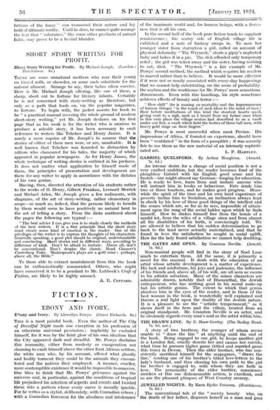SHORT STORY WRITING FOR PROFIT.
THERE are some unnatural mothers who rear their young on tinned milk, or chowder, or some such substitute for the natural aliment. Strange to say, their babes often survive. Here is Mr. Michael Joseph offering, like one of these, a sharp, short cut to fortune for literary infants. Certainly he is not concerned with story-writing as literature, but only as a path that leads on, via the popular magazines, to fortune. To begin with, the jacket asserts his book to be "a practical manual covering the whole ground of modern short-story writing," yet Mr. Joseph declares on his first page that as his work is for the writer who is anxious to produce a saleable story, it has been necessary to omit
reference to writers like Tchehov and Henry James. It is surely a mere caprice of Mr. Joseph's to assume that the stories of either of these men were, or are, unsaleable. It is well known that Tchehov was hounded to distraction by editors who clamoured for his tales, the majority of which appeared in popular newspapers. As for Henry James, the whole technique of writing stories is outlined in his prefaces. It does not matter what application he himself made of them, the principles of presentation and development are there for any writer to apply in accordance with the dictates of his own genius.
Having, then, directed the attention of his students rather to the works of 0. Henry, Gilbert Frankau, Leonard Merrick and Michael Arlen, Mr. Joseph gives a few rudiments, with diagrams, of the art of story-writing, rather elementary in scope—so much so, indeed, that the persons likely to benefit by them would seem to have positively no natural bent to the art of telling a story. From the dicta scattered about the pages the following are typical :—
"The best advice I can give you is to study closely the methods of the best writers. It is a first principle that the short story must create some kind of emotion in the reader. One of the privileges of the writer is to express the thoughts of his characters. Generally speaking, a good plot should be original, understandable and convincing. Short stories end in different ways, according to difference of kind. Don't be afraid to imitate. Above all, don't be conventionaL Don't despise the classic. Read Cbaucer's Canterbury Tales. Shakespeare's plays are a gold mine : perhaps, above all, the Bible."
To those able to extract nourishment from this the book can be enthusiastically commended. Others, who might
have conceived it to be a pendant to Mr. Lubbock's Craft of Fiction, are likely to be highly amused.
A. E. COPPARD.






































 Previous page
Previous page